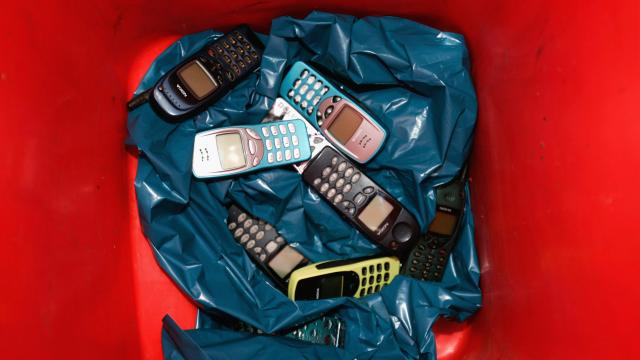I have several pairs of broken headphones, a non-functional PlayStation, and one cracked iPhone with trace amounts of blood on it. While rummaging through useless belongings in my apartment, I often wonder if my used electronics – cracked or not – can ever serve a greater purpose than sitting in my drawer or being thrown in the trash.
But when your old devices wind up in landfills, they can a lot more damage than you think. Generally, electronic waste contains toxic chemicals like mercury, lead or chromium; exposure to these chemicals can cause serious issues for our nervous and reproductive systems. (Children are especially vulnerable.) Worse, we produce some 50 million tons of electronic waste across the globe, endangering any community with a piling e-waste problem.
But really old phones, even that iPhone 5, still carry a ton of value, according to Chase Freeman, a spokesperson for EcoATM, a U.S. kiosk service that recycles and resells old electronic devices. “That device could have a second, third, fourth or fifth life,” he said over the phone. “Not every consumer across the country cares about having the newest iPhone. That old Nokia phone we used 15 years ago may not be worth anything or may be broken, but we can still help the planet.”
Scrub your information before giving up a device
Before you decide to resell or recycle your Blackberry (R.I.P.), there are a few things you should accomplish first. If you want to keep any old photos or files, you might want to back up them up to a hard drive, Google Drive, your iCloud account, or any other safe place, depending on the device.
As Consumer Reports writes, it’s super important you scrub the device, so its next owner doesn’t have access to your private files, too. On tablets, laptops or phones, you should complete a factory reset which will wipe most of your information. (Here’s our guide to resets on an iPhone or Android with a broken screen, in case your phone needs a serious fix.)
In the instance of phones or cameras, you should also remove your SIM card which may contain details like your number or contacts, too. It’s a very simple process on any iPhone or Android.
A number of electronics stores and organisations will accept your devices for trade-in or recycling
If you’ve finally decided to part with your old device, luckily, you have a lot of options – your electronic trash is pretty valuable in the eyes of both recyclers and electronics stores.
Why might you choose to recycle instead of trading in your phone? Well, if your device isn’t in great condition (ie. broken to the point that it won’t even turn on) or totally invaluable (i.e. you’re trading-in a first generation iPhone), it might prove easier to recycle them, Freeman added.
Here are a few noteworthy recycling and trade-in programs you can take advantage of:
-
Apple has a pretty extensive trade-in program for electronic devices of any brand. In exchange, you’ll receive an Apple Store gift card or credit toward a future purchase on an Apple product. (They really want your business after all.) If your device isn’t eligible for a credit, they’ll recycle it on your behalf and for free – don’t worry, they’ll ask for your consent before trashing your device.
-
EB Games will accept gaming consoles, games, gaming accessories, and some phones or tablets for cash or credit. You’ll have to go in store to determine the value of each trade-in item.
-
MobileMuster collects unwanted mobile phones and mobile phone accessories for recycling, and has drop-off points in many phone stores like Vodafone, Telstra, Optus and Samsung.
As CNET writes, if you want to make the most bang for your buck, you might have the best luck selling your device directly to a buyer, using a site like Craigslist or eBay.
Otherwise, check out one of the other options and rest assured that your electronics are in safe hands.

Comments